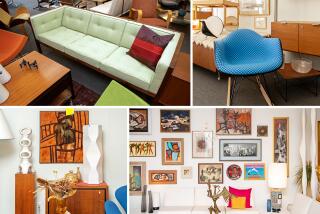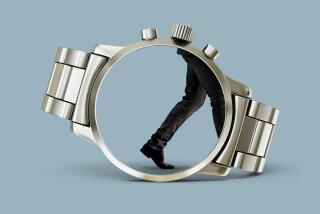Palace Pawnshop Lives Up to Its Name as It Woos the Wealthy
- Share via
Recently, a smartly dressed woman--a string of pearls ringing the collar of her crepe de Chine blouse--glided out of the passenger side of a sky-blue Mercedes and walked into the Palace Jewelry and Loan, a downtown pawnshop. Once inside, she strutted confidently to the teller window at the back of the store and moments later, handbag clutched securely under her arm, she was on her way.
The La Jolla woman had returned to the shop to pick up some of the family jewels she had hocked a few days earlier while suffering a temporary cash flow problem.
A couple of weeks later, a frantic socialite from the South Bay turned to the Palace for help. The lady had scheduled a party for 40 well-heeled guests when, to her dismay, she found a $700 deficit in her budget. Like her La Jolla counterpart, she hocked her jewelry, in this case for $700. The party turned out to be a big success, thank you.
Traditionally, pawnshops have been viewed as victimizers of the poor--dingy, dark places with dusty windows--and located in the worst part of town. To some degree, the stereotype is still borne out in San Diego by often-desperate souls who frequent some stores to pawn items of minimal value in order to survive day-to-day.
But according to Palace manager Jeff Bernard, it’s not unusual these days to find well-to-do types pawning items--at least at the Palace--when they find themselves short of cash.
The Palace has established a chic reputation among some middle- and upper middle-class circles in San Diego County. After all, what other pawnshop in town schedules appointments for important customers whose busy schedules do not allow them to just drop by when a need for cash necessitates hocking a personal item? And where else can such normally affluent citizens get that kind of money without waiting for days while a bank loan officer peruses credit record and application?
Since Bernard began managing the store 10 years ago, he has transformed it into a business where wealthy customers from La Jolla and La Costa are not embarrassed to be seen hopping out of their Rolls-Royce and Mercedes cars to pawn expensive items for quick cash. In addition to North County socialites willing to hock their keepsakes, Bernard counts several lawyers and doctors among his regular clientele. Because of such customers, Bernard estimates that about 85% of the items pawned at his store are eventually reclaimed.
“For the most part, our clientele reflects the quality of the store. The truth is that our store is different from most pawnshops,” Bernard said. “Look around. If it weren’t for the (pawnbroker’s symbol) in the window you’d think we were an exclusive jewelry store that also handles expensive oil paintings and antiques.”
To most people, a pawnshop appears to be overflowing with useless mementos of no particular value or interest--glass masquerading as diamonds, omnipresent watches, televisions and guitars crammed on every shelf and in every corner. But if truth be told, the Palace is expensive as pawnshops go, stemming in part from Bernard’s business “training” as a child.
Bernard owes his business acumen to his mother, who, he says, would rock him to sleep with the soothing words “buy low, sell high” when Bernard was a baby. For the past 18 years, Bernard, 34, has been wheelin’ and dealin’ in a medieval trade that he proudly calls the world’s second oldest profession.
Like the women who ply the oldest of trades, pawnbrokers have not always enjoyed a favorable image, said Bernard, a fast-talking, friendly soul with a rapidly receding hairline and a disarming smile that quickly puts pawners at ease. Think what you may of pawnbroking, Bernard likes to think that western civilization may have advanced no further than the shores of Europe had it not been for pawnbrokers.
Although historians have largely discounted the legend of Queen Isabella’s jewels, Bernard smiles and assures the disbelieving that Isabella did pawn her jewels to finance Columbus’ first trip to the New World.
“I’m telling you, when Columbus set sail from Spain, the queen pawned her jewels . . . Pawnbrokers have been in the middle of wheelin’ and dealin’ since the beginning of man,” Bernard said. “Who knows what course history would’ve taken if the queen hadn’t made her move?”
Thank goodness for Isabella. Where would Bernard and the Palace be today had it not been for the wise queen’s fortuitous move?
According to Bernard, “There are pawnbrokers and pawnshops that are real elite.” And he leaves no doubt that he lists himself and the Palace, as the store’s name suggests, among them. Bernard points to the antique 18th-Century pawnbroker’s sign, the traditional three shiny balls hanging like a mobile from a wrought iron fixture, and his impeccably dressed and groomed staff of seven to prove that his store stands out from the crowd.
To be sure, the Palace is not typical of the pawnshops to be found in the Gaslamp Quarter, which are frequented by sailors. In fact, Bernard argues, his store may be without peer in the county and excelled in Southern California only by the Beverly Loan Co., a truly high-class Beverly Hills pawnshop located in an upstairs suite on Wilshire Boulevard. The Beverly Hills store serves as an inspiration for Bernard and represents dreams of things to come.
But for the present, the Palace is not doing too badly. To begin with, the store lies across from trendy Horton Plaza, on 4th Avenue. And the flavor of the Disneyland-like collection of stores and shops has spilled across the street to the haute pawn Palace.
Rolex watches, some of which sell for $15,000, and heirlooms such as $25,000 brooches have been left in pawn at the Palace by wealthy owners who suddenly found themselves in need of money, Bernard said.
“You may be worth millions of dollars, but if you don’t have a hundred bucks in your pocket, there’s not much you can do,” Bernard said. “So, if you’ve got the merchandise, you go pawn it, knowing you can always pick it up later in the week, when your cash flow gets better.
“About a month ago this lady was referred to me from Chula Vista. She and her husband own a construction company and needed $2,500 to meet their payroll the next day. . . . She pawned some of her diamond jewelry, got enough money to meet her payroll and returned three weeks later to pick up her jewels.”
For customers with expensive tastes who find the prices at Horton Plaza more than they bargained for, the Palace offers tasteful and elegant pieces of jewelry, art and Old World antiques. Among the items available to the Christmas shopper who has more than a few dollars to spend are a $4,500 antique piano, a $2,500 oil painting, genuine silver flatware beginning at almost $1,000 and diamonds big enough to make even Isabella jealous.
Granted, the items are beyond the price range of the average shopper, but not of the group of shoppers that Bernard calls the “divine people.”
“Divine people are usually reluctant to buy used items. But when the merchandise is unique, with a high degree of quality, even demanding shoppers can be pleased by the items we carry,” he said.
However, it is not just Bernard who argues that his pawnshop caters to the discriminating shopper. Other pawnbrokers in town frequently send customers to Bernard, particularly people who need more than the maximum $500 loaned by most pawnshops in town.
Bernard, who was 16 when he began working in a Pomona pawnshop, frequently makes loans of up to $2,000 and says he could go higher given the value of the item that is pawned.
“The real secret to making money from loans is knowing when not to loan too little or too much. And you acquire this instinct only through experience,” he said.
Another local pawnbroker, who asked to remain anonymous, agreed that the Palace is a breed apart from other pawnshops.
“It wasn’t always like that. The Palace used to take in stuff that’s found in most pawnshops. But Horton Plaza has a lot to do with what he’s (Bernard) doing. You gotta give him credit. He’s emphasizing good jewelry at lower prices and does very well against Slavicks and the other jewelry stores in Horton Plaza . . . Sure, I wish I had his location,” the man said.
Except for gold items, the value of which usually increases or remains constant, pawnbrokers are not guided by a set of rules that dictates how a product is appraised.
“I have no set percentage of value that I give to a product. But this business is still more of a science than theory. A pawnbroker really has to know merchandise . . . I don’t care what somebody paid for an item when it was new . . . I base its value on how much I think I can get for it,” Bernard said.
For example, if an item sold for $800 new, but Bernard thinks that he can sell it for no more than $400, he will buy it for $100 or loan that much on it. However, jewelry items are not so easily appraised.
“Jewelry is a matter of individual taste, and experience is crucial in pricing jewelry that somebody wants to pawn. It’s never easy to decide what (jewelry) items are going to appeal to buyers. There are some items that I think are great. I’ll put them in the window and they stay there for months before someone buys them . . . Then, I’ve had some of the ugliest, hideous things put out and invariably, they’re bought right away. So, you never know with jewelry,” Bernard said.
The mystique surrounding pawnbrokers is due to the misconception about how the business operates, he said. Pawned items are not immediately put up for sale. Instead, the store has to report to police every item pawned or sold to the store. By law, purchased items cannot be resold for 30 days and only after police certify that they are not stolen. Pawnbrokers are also prohibited from accepting items unless the customer provides proper identification.
When an owner pawns an item, he has a little over six months to pay off the loan received on the item, or forfeit it to the pawnbroker. Six months after pawning the item, the store mails a notice to the owner advising him that he has an extra 10 days to reclaim it or lose it. If the owner does wants the item but cannot pay off the loan, the deal can be renegotiated, so long as he pays the outstanding interest.
“Most people have no conception of used value . . . Navy guys come in all the time who tell me, ‘Look, I paid $500 for this, but I’m willing to take a $100 loss and sell it to you for $400.’ Well, it doesn’t work this way,” Bernard said.
Pawnbroking has survived because regardless of the economic conditions of the time, pawnshops will always find a need and fill it, he said.
“We can’t lose in this business. When the economy is good and people have money to spend, they’re buyers. But people are buyers anyway. When the economy is bad you have people taking out loans. And in a bad economy people start thinking ‘used’ when there isn’t enough money to spend. Then you get people who come in to buy used items that fill the need as well as newer but more expensive items,” Bernard said.
More to Read
Inside the business of entertainment
The Wide Shot brings you news, analysis and insights on everything from streaming wars to production — and what it all means for the future.
You may occasionally receive promotional content from the Los Angeles Times.










